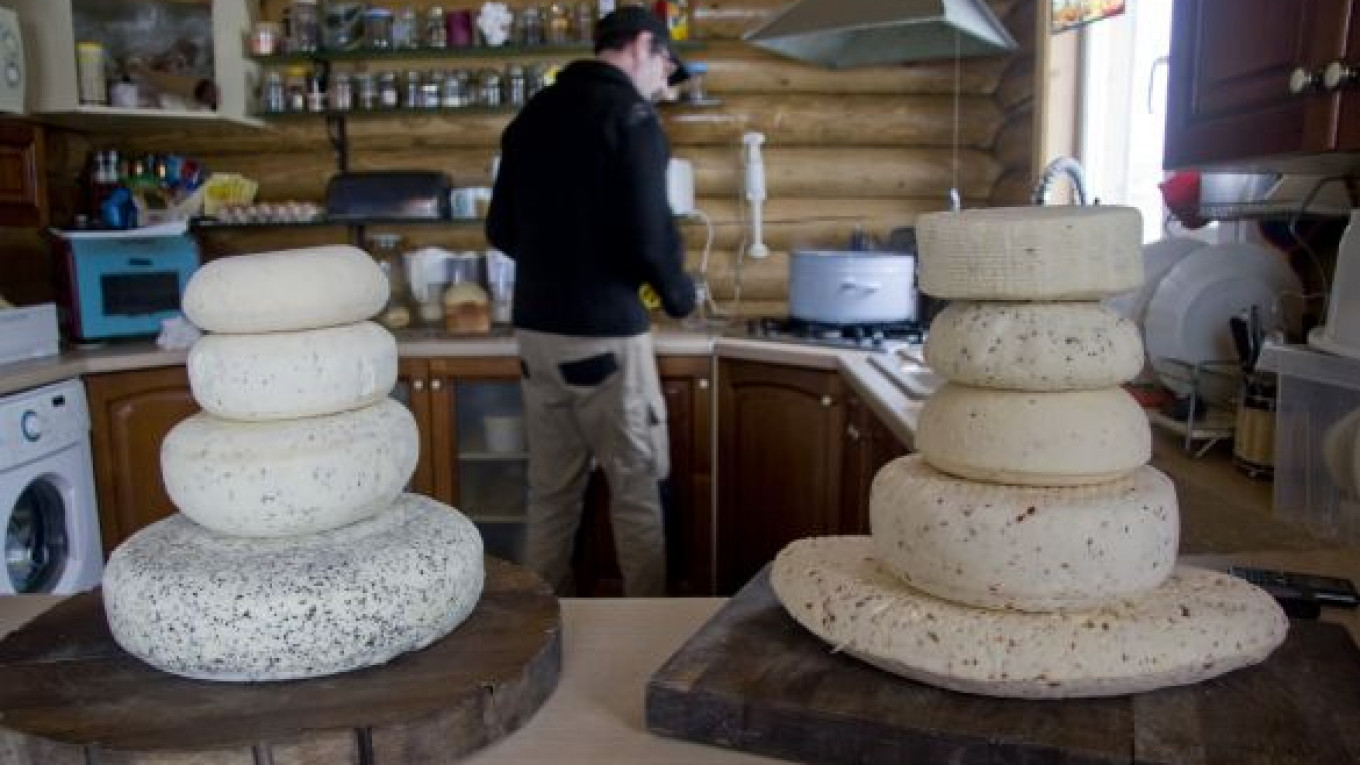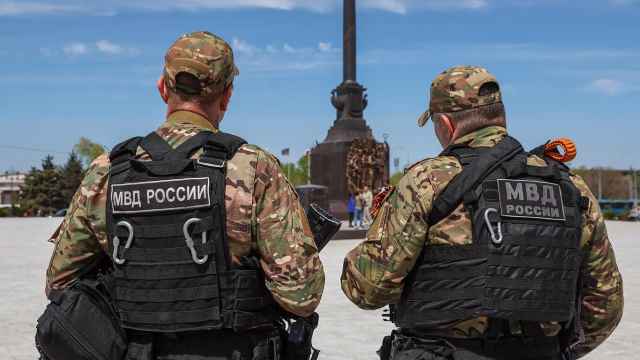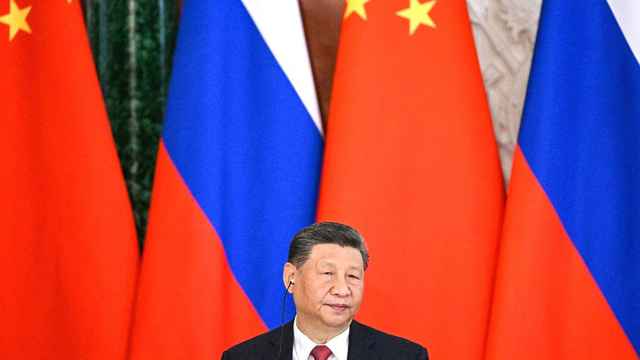MOSHNITSY, Moscow Region — When New York native Jay Close crossed Russia's border on a Red Cross humanitarian visa in 1993, little did he know that he would wind up in a small village with a mission to make cheese.
Once a chef in Paris, Close, 48, is now fully immersed in Russian rural life, trying to succeed in a venture where most locals fail and what experts dub "impossible" — private dairy farming.
It has been about a year since Close settled in the village of Moshnitsy, about 70 kilometers southwest of Moscow, a typical settlement where old wooden shacks lie decaying next to newly built brick mansions, surrounded by broken roads full of potholes and slush.
Before building his own log house here, Close traveled to and from Russia for almost two decades — enough to learn everything about local corruption and bureaucracy. But this knowledge didn't discourage him from buying a patch of land and setting up his own cheese production.
"I got tired of traffic jams and employers who hire and don't pay," Close said in a recent interview at his farm. He seems to be happy with his life choice that, although rich in challenges, looks like quite a success story.
"We tried making cheese for ourselves, and people liked it," he said.
Now, "every day I produce 10 kilos of cheese, and 70 kilos a week if there are a lot of orders," he said. He plans to step up production to 40 to 80 kilograms a day after buying more cows and acquiring new equipment from the Netherlands.
Close, who chain-smokes Saint Georges like a true Russian and strokes his Frank Zappa mustache as he speaks, recalled how he first came to Russia at the invitation of friends, looking to escape depression over employment problems in Paris. It took him $200 and 10 minutes to get a humanitarian visa, plus a block of cigarettes to pass though customs.
"I already loved that country before I got there," Close said.
Nowadays, visa regulations make him leave Russia every three months, but he insisted that he still loves the country.
Other changes that Russia has undergone since 1993 have made it possible for Close to open his dairy farm.
Russia's dilapidated agriculture in the 1990s was in a much worse shape than by early 2010, Close said, reminiscing about shopping for "beaten Chernobyl tomatoes" and "carrots weighed with soil" at Moscow's Kuzminki market. "I thought: 'How can I make anything of these?'" he said.
Several years later, he married a Russian woman, shelled out "some $10,000 to $12,000" for a plot of land, and settled in Moshnitsy for the sake of cheese, as he later learned.
Red Tape and Graft
When asked what the biggest obstacle to his business is, Close barks out quickly: "Bureaucracy!" Unsurprisingly, legal production of cheese requires many "certificates and spravki" — in other words, kilometers of red tape.
Close acknowledged that he also has gotten used to another notorious Russian problem — corruption. He declined to say whether he has to pay bribes to stay afloat.
"Corruption can work against you, and corruption can work for you," Close said, citing traffic rules as a good example. A motorist caught breaking rules in Russia can just pay the police officer and be on his way, while in the United States, "one has to deal with paperwork," he explained.
But in Russia, police officers, along with many other people, tend to rip foreigners off, Close said. He learned this the hard way when he hired locals to build his house, which he called "a mistake."
"We agreed on a salary, and when they started working they wanted more money," he said. After a week of toil, "they built a well sideways," and he had to hire more workers to build a new one.
Moreover, he has to buy all equipment and bacteria for his cheese in the Netherlands, saying neither was available in Russia.
Cheesy Job
Close's farm comprises two cows, named Belladonna and Billie Jean, a sheep and a few goats. To produce 10 kilos of cheese, Close has to buy milk from bigger farms nearby, and he hopes to expand his herd by four cows. He also has two dogs, a cat and an iguana called bin Laden.
Close's catalog lists about 20 kinds of cheese, among them goat cheese, blue cheese, mozzarella, and cheeses with spices, ginger, basil and garlic. He said his produce, which can be found at several venues in Moscow and the Lavka online store, is popular among Swiss and French expatriates — people who generally know a thing or two about cheese.
But well-off Orthodox Christian believers are also among his clients, as he noted a decline in sales during Lent — "the great Russian diet" when consumption of dairy products is restricted.
"People with money buy my cheese because it's three times above the supermarket price but it's organic, while at stores, the cheese is made with powdered milk," Close said.
His prices range from 600 rubles to 900 rubles ($21 to $31) per kilogram, depending on the milk and additional ingredients. This is, indeed, above regular retail prices, with the populace last year sticking to cheese priced on average at 250 rubles per kilogram, according to the State Statistics Service.
No Country for Small Farms
Close is one of the few people in Russia who have risked opening a small private dairy farm. The business, common in Western countries with deep-rooted cheese-making traditions, is still fledging in Russia, whose dairy industry is described by experts as "simply bad."
"Unlike in Europe, Russian cheese is traditionally produced by large factories in order to reduce production costs," Vladimir Cheverov, director of the milk-processing department with the Soyuzmoloko dairy lobby group, said in a telephone interview.
In the Kaluga region, a Swiss-owned hotel used to run an enterprise called Swiss Milk Farm that produced 20 kilograms of cheese a day about two years ago, but it had to give up the idea due to problems linked to licensing and a lack of premises.
"We had to obtain a license every year, which is not an easy thing. And one year ends fast, you know," Yulia Michel, the hotel administrator, said by telephone.
"In addition, we didn't have enough space for the equipment," she said. Now they stick to milk production and eco-tourism.
"In the nearest future, small-scale cheese production is impossible in Russia," said Tatyana Kuznetsova, editor of the Molochnaya Promyshlennost (Dairy Industry) magazine.
"If even big plants are hardly surviving, how can a small farm manage it?" she said by telephone.
Cheverov agreed that in practice, small farms can hardly survive due to vast expenses.
Creating a farm is feasible, but logistics and promotion for its produce require a lot of time and money, he said. What's more, the equipment is so expensive that it would take a farmer "dozens of years" to cover the cost, Cheverov said. Equipment to produce 1 ton of cheese a day may cost about $2 million, he said.
The Market for Cheese
Selling homemade cheese can also be a headache, because domestic produce is losing market to imports. Russians have never been hearty cheese eaters. In the 1870s, peasants expressed surprise at "how lords can eat that cheesy thingy," educated landlord Alexander Engelgardt recalled in his memoirs. Currently, annual consumption stands at 6 kilograms of cheese per person — far below Europe, where the figure for France, for example, is 28 kilograms.
Production is adjusted accordingly. Each of the 200 big cheese-making enterprises in the country produces 3 to 15 tons of cheese a day, while in smaller European countries they make from 10 to 50 tons, Cheverov said. There are no data available on small farms in Russia.
Last year, the volume of the cheese market by number of sold units increased 6.1 percent to 687,000 tons, the Dairynews.ru portal citing research by RBC. But that was due to growth of imports, which accounted for 37 percent of the market in 2010, it said. No data for 2009 were available.
"The sales are very low. Even 2010-made [Russian] products haven't been sold out yet," Kuznetsova said in May.
Expensive cheese like Close's occupies a tiny 1 percent to 3 percent of the market, with customers concentrated in big cities like Moscow and St. Petersburg.
The government is trying to help, increasing duties on imported cheese to 15 percent but no less than 60 euro cents (80 cents) per kilogram. But domestic producers, who lobbied for the move, say they need further protection.
"Russian cheese makers are in a tough situation. If we want to preserve the industry, we need higher duties," Cheverov said.
Then there is competition from post-Soviet neighbors. Belarussian products in particular are hard to compete with because milk is cheaper there than in Russia, Kuznetsova said.
Russian milk prices averaged 14 rubles per liter last year, while in Belarus it is about 5 rubles, and in Ukraine 6.5 rubles. Besides, Russian milk is often less creamy than Ukrainian or Belarussian milk and thus unfit for cheese making, which results in a "shortage of milk for the industry," Kuznetsova said.
The dismal statistics do not impress Close.
"I want to enlarge my production," he said. "I don't plan to give up."
A Message from The Moscow Times:
Dear readers,
We are facing unprecedented challenges. Russia's Prosecutor General's Office has designated The Moscow Times as an "undesirable" organization, criminalizing our work and putting our staff at risk of prosecution. This follows our earlier unjust labeling as a "foreign agent."
These actions are direct attempts to silence independent journalism in Russia. The authorities claim our work "discredits the decisions of the Russian leadership." We see things differently: we strive to provide accurate, unbiased reporting on Russia.
We, the journalists of The Moscow Times, refuse to be silenced. But to continue our work, we need your help.
Your support, no matter how small, makes a world of difference. If you can, please support us monthly starting from just $2. It's quick to set up, and every contribution makes a significant impact.
By supporting The Moscow Times, you're defending open, independent journalism in the face of repression. Thank you for standing with us.
Remind me later.






